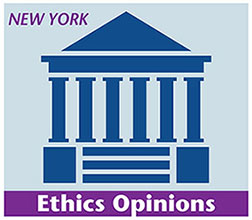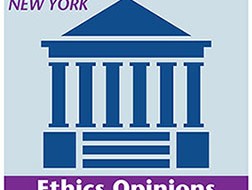Recent N.Y. Ethics Opinions: January 2016
By Tyler Maulsby, Associate, Frankfurt Kurnit Klein & Selz
Here are summaries of ethics opinions issued July and August 2015. The opinions were issued by the NYSBA Committee on Professional Ethics. NYLER will continue to provide updates on new ethics opinions issued by NYSBA and other ethics committees in New York State.
For information about how to obtain an ethics opinion from the NYS Bar Association Committee on Professional Ethics, please visit http://www.nysba.org/Ethics/.
NEW YORK STATE BAR ASSOCIATION OPINIONS
NYSBA Ethics Op. 1067 (July 27, 2015):
Current Client-Prospective Client Conflicts of Interest and the Duty to Inform
Opinion 1067 addresses a law firm’s ethical duties when an adversary in one matter inadvertently becomes a prospective client of the firm. The law firm represents a father, who was a long-time client (“Father”), in a highly contested proceeding brought by Father’s adult child (“Child”) over the guardianship of Father’s wife. Several months after the guardianship proceeding ended, Child attended a seminar on estate planning held by one of the firm’s partners (“Partner”) and subsequently contacted Partner for a consultation. After the consultation with Child, Partner learned of the firm’s representation of Father and the earlier guardianship proceeding. The Opinion answers three questions: (1) whether the New York Rules of Professional Conduct require the firm to disclose to Father that Child sought to retain the firm on an unrelated matter; (2) whether the firm can continue to represent Father in light of Partner’s consultation with Child; and (3) whether the firm is required to inform Child’s lawyer from the guardianship proceeding that Child sought to retain the firm for estate planning. The Opinion assumes that Child was acting in good faith when he consulted the lawyer and was therefore a “prospective client” under the Rules. See Rule 1.18(a) (prospective client is one “who discusses with a lawyer the possibility of forming a client-lawyer relationship with respect to a matter.”).
Since Child is a prospective client, the Opinion reasons, “Rule 1.18(b) prohibits the lawyer from ‘using or disclosing prospective client information only if the information is ‘confidential information’ as defined in Rule 1.6, and even then only if the information was ‘learned in the consultation.’” The Opinion explains that under Rule 1.6 “confidential information” falls into three categories: “(i) information ‘protected by the client-attorney privilege’; (ii) information that is ‘likely to be embarrassing or detrimental to the [prospective] client if disclosed’; or (iii) ‘information that the [prospective] client has requested be kept confidential.’” Whether the information Partner learned during the consultation falls into any of these categories is an issue of fact. If Partner determines, however, that the information about Child’s “identity, consultation with [Partner] about possible representation, and the general subject matter of that consultation, fits under any of the rubrics of confidential information” then Partner, and the firm may not disclose such information. With regard to the firm’s duty to notify Father, the Opinion reasons that Rule 1.4(a)(1)(iii) obligates a lawyer to inform the client of “material developments in the matter.” Whether certain information is “material” to the representation should be determined on a case-by-case basis. However, if the firm concludes that the information learned during the consultation is material to the representation of Father then the firm would face a dilemma where it has a duty of confidence to its prospective client (Child) and a duty to notify its current client (Father) about the same information. If the information learned during the consultation is unrelated to the representation of Father, then the firm has no obligation to notify Father about the consultation. Second, the Opinion analyzes whether the firm has a conflict of interest in its continued representation of Father. Under Rule 1.18(c), the firm would be prohibited from representing Father in a matter “substantially related” to the matter about which Child sought representation if the interests of Child were “materially adverse” to Father’s and the firm obtained information that could be “significantly harmful” to Child in the matter. While the Opinion does not opine on the degree of harmfulness of any information learned during the consultation, it concludes that the firm would have to determine that the information learned from Child would be “significantly harmful” in order to create a conflict of interest. Finally, the Opinion concludes that the firm has no duty to disclose the consultation to Child’s lawyer from the guardianship proceeding. If Partner learned confidential information during the consultation, the firm would be prohibited from doing so.
The Opinion is available at: https://www.nysba.org/CustomTemplates/Content.aspx?id=57804
NYSBA Ethics Op. 1068 (Aug. 10, 2015):
Partnership with a Nonlawyer Claims Recovery Firm
Opinion 1068 addresses whether a lawyer may enter into an arrangement with a nonlawyer Claims Recovery Firm where the Claims Recovery Firm would hire the lawyer to represent the client corporation as plaintiffs in an action, the Claims Recovery Firm would receive a contingent commission from any recovery, and the Claims Recovery Firm would pay the lawyer a portion of its commission. Under Rule 5.8(a), a lawyer may not have an exclusive referral relationship with a nonlegal professional service firm unless the professional service firm is included on a list jointly established and maintained by the Appellate Divisions. Because claims recovery firms are not included on this list, the Opinion concludes, an exclusive relationship with the Claims Recovery Firm would be prohibited. The Opinion notes, however, that Rule 5.8(a) does not apply to “non-exclusive reciprocal referral agreements” between a lawyer and a nonlegal professional service firm. If the relationship is non-exclusive, the Opinion reasons, the relationship must still comply with other applicable rules. Specifically, Rule 5.4(c) requires that the lawyer “shall not permit a person who recommends, employs or pays the lawyer to render services for another to direct or regulate the lawyer’s professional judgment in rendering such legal services.” Similarly, the lawyer may not use the Claims Recovery Firm to do what that the lawyer would otherwise be prohibited from doing in violation of Rule 8.4(a). For instance, because the lawyer is prohibited from engaging in in-person solicitation under Rule 7.3, the lawyer could not allow the nonlawyer Claims Recovery Firm to do the same. With regard to fee-sharing, Rule 5.4(a) generally prohibits a lawyer from sharing legal fees with a nonlawyer. Citing prior ethics opinions, the Opinion reasons that this prohibition also includes a lawyer reducing his fee to “free-up funds” for the client to pay the nonlawyer unless the nonlawyer was performing services worth the amount of the reduced fee. The Opinion concludes, therefore, that “[i]f the Claims Recovery Firm provides substantial assistance in the proceedings and the compensation of the Claims Recovery Firm is commensurate with the services it provides, then the lawyer would not be sharing legal fees with a nonlawyer in violation of Rule 5.4(a) even if the lawyer reduces his fee by the amount of the Claims Recovery Firm’s compensation.” Similarly, if the Claims Recovery Firm’s compensation does not exceed the reasonable value of its services, then the Claims Recovery Firm’s fee would not be a prohibited referral fee in violation of Rule 7.2(b). Finally, the Opinion cautions that Rule 5.5(b) prohibits the lawyer from assisting the Claims Recovery Firm in engaging in the unauthorized practice of law. While the Opinion does not opine on whether the Claims Recovery Firm is engaged in unauthorized practice of law, it notes that activities of the Claims Recovery Firm, particularly in identifying potential antitrust claims, raise serious questions about unauthorized practice of law, and the inquirer should consider them carefully.”
The Opinion is available at: https://www.nysba.org/CustomTemplates/Content.aspx?id=57957.
NYSBA Ethics Op. 1069 (Aug. 19, 2015):
Concurrent Representation in Family Court and Immigration Proceedings
In Opinion 1069, an attorney represents an immigrant child in an administrative removal proceeding. Under relevant federal law, the subject child may gain lawful permanent residency if the lawyer can show, inter alia, that the subject child is “dependent on a juvenile court” and that reunification with the child’s parents is not in the child’s best interests. In order to meet this standard, the lawyer intends to petition the New York Family Court for the appointment of a guardian for the child. The lawyer intends to represent the proposed guardian in the Family Court proceeding. The Opinion analyzes the proposed concurrent representation under Rule 1.7, which prohibits the lawyer from representing clients with “differing interests” or if there is a “significant risk that the lawyer’s professional judgment on behalf of a client will be adversely affected by the lawyer’s own financial, business, property or other personal interests.” With regard to “differing interests,” the Opinion acknowledges that there may be many scenarios where the child and the proposed guardian’s interests are aligned, in which case, no conflict would exist. The Opinion concludes, however, that the lawyer must be “sensitive to changes that might create differing interests” and that such changes would be addressed if the Family Court appointed separate counsel for the child in the Family Court proceeding.” Even where the lawyer and the proposed guardian do not have differing interests, the lawyer must still reasonably conclude that he can provide competent and diligent representation to both parties and obtain informed consent in writing from each client in accordance with Rule 1.7(b). On this point, the Opinion notes that there is some support for the proposition that a child cannot consent to dual representation. Notwithstanding that line of cases and opinions, the Opinion concludes that the lawyer “must assess whether the child has the capacity to make a reasoned decision regarding the potential conflict … [i]f the lawyer concludes that the immigrant-child is capable of making a reasoned decision, the lawyer must provide the child with information and explanations suitable to the child’s level of understanding.”
The Opinion is available at: https://www.nysba.org/CustomTemplates/Content.aspx?id=58066.
Get CLE Credit for this month’s articles (January 2016).
DISCLAIMER: This article provides general coverage of its subject area and is presented to the reader for informational purposes only with the understanding that the laws governing legal ethics and professional responsibility are always changing. The information in this article is not a substitute for legal advice and may not be suitable in a particular situation. Consult your attorney for legal advice. New York Legal Ethics Reporter provides this article with the understanding that neither New York Legal Ethics Reporter LLC, nor Frankfurt Kurnit Klein & Selz, nor Hofstra University, nor their representatives, nor any of the authors are engaged herein in rendering legal advice. New York Legal Ethics Reporter LLC, Frankfurt Kurnit Klein & Selz, Hofstra University, their representatives, and the authors shall not be liable for any damages resulting from any error, inaccuracy, or omission.
Related Posts
« New York’s Catch-All Rule: Is It Needed? Part 2 Does N.Y. Judiciary Law §487 Apply to Arbitrations? »







